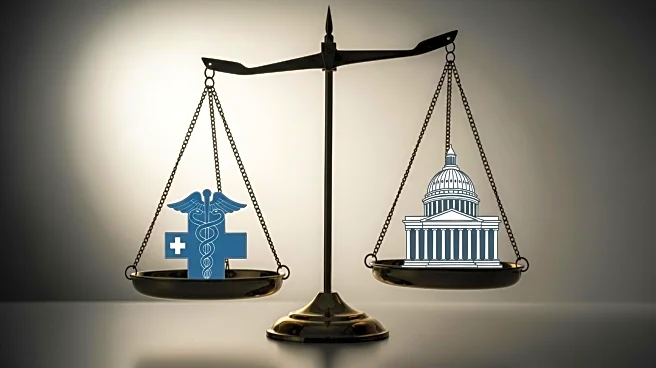What's Happening?
The U.S. Senate has failed for the fourth time to pass a spending bill to end the government shutdown, which began on Wednesday. The deadlock is primarily due to disagreements over health care funding, with Democrats demanding the extension of Affordable Care Act subsidies and the reversal of recent cuts to Medicare and other health programs. The shutdown has led to furloughs and disruptions in government services, affecting federal workers and citizens reliant on government programs. Interviews with voters reveal a mixed sentiment, with some blaming both parties for the impasse, while others hold President Trump and the Republicans responsible for the lack of compromise.
Why It's Important?
The ongoing government shutdown has significant implications for U.S. politics and public policy. It highlights the deep partisan divide in Congress, particularly over health care funding, which remains a contentious issue. The shutdown affects federal employees, disrupts services, and could have broader economic impacts if prolonged. The political fallout may influence voter sentiment in upcoming elections, as both parties risk being blamed for the stalemate. The situation underscores the challenges in achieving bipartisan cooperation on critical issues, potentially affecting future legislative negotiations.
What's Next?
As the shutdown continues, pressure mounts on both parties to reach a compromise. The potential for mass layoffs and further disruptions in government services could force a resolution. Stakeholders, including political leaders and civil society groups, may intensify their calls for action to mitigate the impact on citizens and the economy. The Senate is expected to reconvene for further votes, but the path to ending the shutdown remains uncertain. Observers anticipate that a compromise will eventually be reached, as has been the case in past shutdowns.
Beyond the Headlines
The shutdown raises ethical concerns about using government employees and citizens as leverage in political negotiations. It also reflects broader issues in U.S. governance, such as the difficulty in balancing fiscal responsibility with social welfare needs. The impasse may lead to long-term shifts in public opinion regarding health care policy and government spending priorities. Additionally, the shutdown could influence future political strategies, as parties reassess their approaches to negotiation and compromise.











